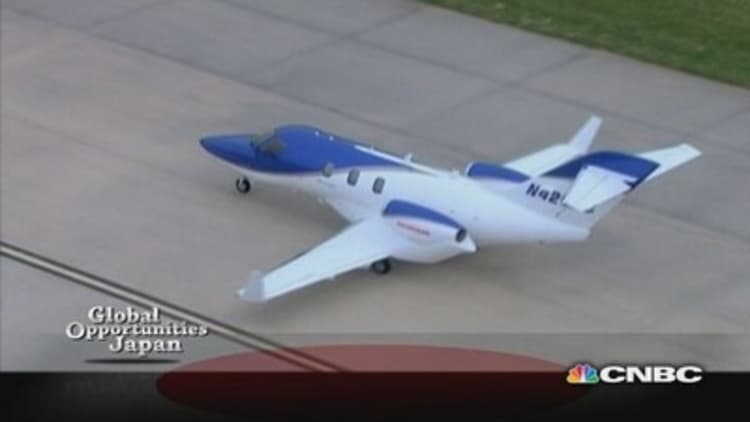
Honda is used to making vehicles capable of carrying up to six passengers, but next year one of its products is slightly different.
For the first time, Honda will be selling an aircraft: the HondaJet.
The plane is dubbed by its makers "the fastest, highest-flying, quietest, and most fuel-efficient jet in its class," with particular emphasis given to the Over-The-Wing Engine Mount (OTWEM) design.
As the acronym explains, Honda has placed the engine over the plane's wing, thus reducing aerodynamic drag while at the same time reducing cabin sound and freeing up more space for passengers. It is priced at $4.5 million.
"This is a true breakthrough technology, and this is a key technology that distinguishes HondaJet from other competitors," Michimasa Fujino, president and CEO of Honda Aircraft Company, told CNBC.
(Read more: Private jet makers bet on US, not Asia for big orders)
The jet's flight path
Fujino spoke to CNBC about the company's long path to jet production. He joined Honda in 1984, at first working on the automobile division until "one day my boss came to me at lunch time and he told me that you go to the airplane project."
He was sent to Mississippi in 1986 to learn how to build a plane from scratch. After ten years, he had his "eureka" moment.
"One day I went to bed and in the middle of the night I thought of a new idea. You know if I could put the engine over the wing I might be able to satisfy, or meet the requirement of performance or comfort or high speed or efficiency," Fujino said. He jotted his idea on the back of a calendar.
The HondaJet is now in the final stages of the U.S. Federal Aviation Authority's complex and lengthy certification process, with final approval expected in the first quarter of 2015.
This revolutionary design was not an easy one to embrace over a decade ago by a company not known for its aviation and dealing with a difficult economic situation.
(Read more: What do you get in a private jet?)
Takeo Fukui, the former president of Honda Motor, told CNBC: "The nineties was a very tough time for us, it was when the yen was super strong. But we decided to allocate what little resources we had and invest it for our future."
He added: "What makes Honda, Honda? We add value to customers around the world through personal mobility. We wanted to be involved in all kinds of personal mobility. Two-wheelers. Cars...These are all two-dimensional. But what I really wanted for our future was in the third dimension. That was the HondaJet."
Worth the wait?
As excited as Honda is about its latest product, it is still entering an unfamiliar sector, and the very light jet market was hard hit by the recession.
Honeywell International, which produces aerospace systems for a wide variety of customers, forecasts that up to 9,250 new business jets will be delivered in the next decade, but large-cabin jets will account for more than 55 percent of those purchases.
Michel Merluzeau, managing partner at G2 Solutions, said the very light jet market "was the hardest hit by the recession. We forecast about 1,000 deliveries in the personal light jet/very light jet market between 2014 and 2020."
However, HondaJet has already secured 100 orders and Fujino expects the very light jet market to see about 400 sales per year in the next few years.
Merluzeau said the HondaJet was an interesting product but added: "Overall, we believe that Honda will be able to capture about five percent of annual deliveries by 2020, rising thereafter. We expect that Honda will deliver about 300 aircraft by 2020."
Most analysts agreed that what Honda had going for it was its name and prestige, which will hopefully lend it some clout when competing against its competitors such as Cessna, Embraer and Beechcraft.
(Read more: Watch: Best selling private jets)
Steve Varsano, founder of the luxury private aircraft company The Jet Business (based in London) said: "Most importantly, the great pedigree in terms of the Honda name, financial backing, support and service is a real help to get the initial attention of the marketplace, but I don't believe it will do anything for selling more aircraft, except maybe getting a meeting with a potential buyer that may otherwise might not have taken a meeting."
Still, while this is a difficult market for a newcomer, Wayne Plucker, the North America director for Aerospace and Defense at Frost & Sullivan argued that this could be great timing from Honda.
"When the market crumpled, the people who were buying these size of jets -- the entrepreneurs, the day traders -- they were the people who lost their shirts. So the market for this very light category of jet evaporated overnight. Now it's starting to come back, probably with a little different clientele, a little longer term wealth, and Honda's timing is pretty good because this market is coming back."
—By CNBC's Kiran Moodley. Follow him on Twitter @kirancmoodley

